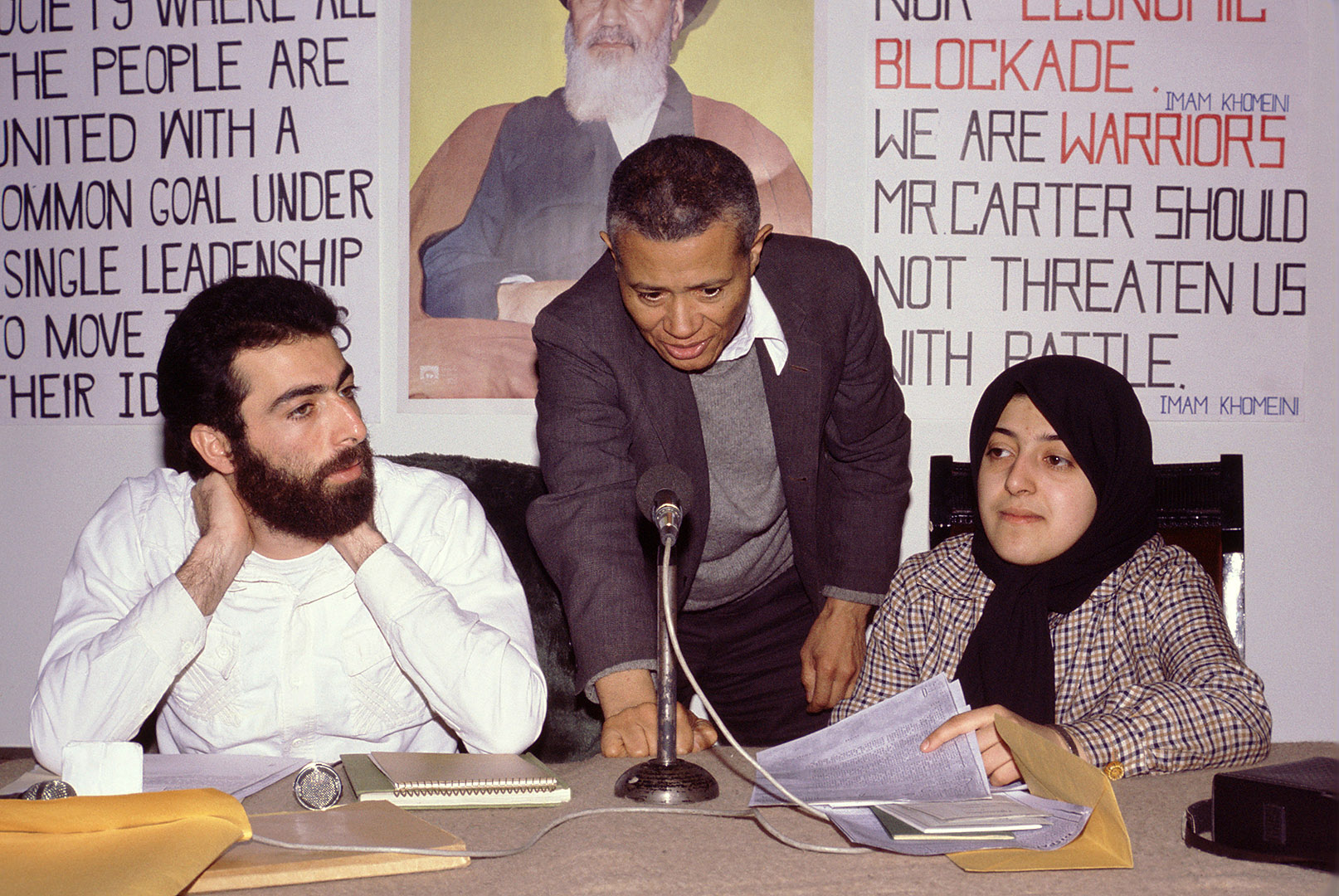
Bates in the News: Feb. 15, 2019
Joyce White Vance ’82
Paul Manafort’s day in court spells trouble for Trump — The Washington Post
In recent months, the news media have often turned to Joyce White Vance ’82 to explain legal maneuverings in the ongoing investigation by special counsel Robert Mueller into Russian interference in the 2016 U.S. elections.
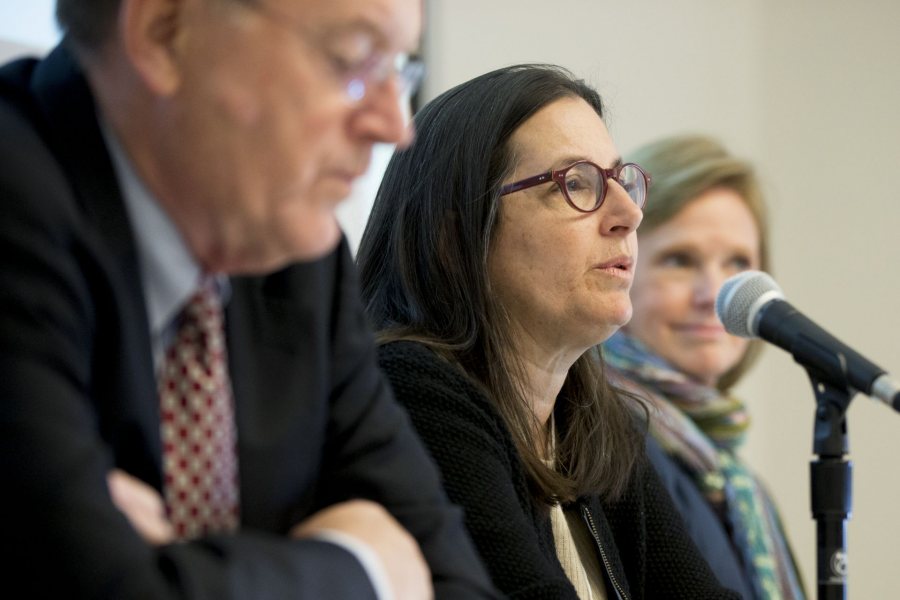
Law professor and former U.S. attorney Joyce Vance ’82 speaks during a 2016 Bates panel on criminal justice reform in Maine. (Phyllis Graber Jensen/Bates College)
A contributor to MSNBC and quoted frequently in outlets like NBC News, The New York Times, and The Washington Post, Vance served as a U.S. Attorney for the Northern District of Alabama from 2009 to 2017 and is now a Distinguished Professor of the Practice of Law at Culverhouse School of Law at the University of Alabama. She will be speaking at Bates on March 21.
As Politico noted in a story last summer about the emergence of Vance and other legal experts, their job is to “try to bring sanity to the whirlwind of information” about various aspects of the Mueller probe.
Most recently, Vance has helped untangle issues raised by the news that former Trump campaign chairman Paul Manafort lied to prosecutors after his plea deal.
“The open question is whether Manafort was freelancing or whether others from the campaign were involved” in contacts with the Russians in 2016, Vance tells The Washington Post.
- Related: “Paul Manafort’s day in court spells trouble for Trump,” The Washington Post, Feb. 14, 2019
- Related: “Meet the Mueller pundits,” Politico, July 2, 2019
- By Vance: “Will the public find out if Trump directed campaign contact with Stone on Wikileaks?” Just Security, Feb. 5, 2019
Caroline Baumann ’87 and Erik Kondo ’87
Designing for Everyone — World Economic Forum Annual Meeting
Caroline Baumann ’87 is director of the Cooper Hewitt, Smithsonian Design Museum, in New York City, and she opened her presentation on inclusive design at the World Economic Forum in Davos, Switzerland, by talking about her classmate Erik Kondo ’87.
In this excerpt from her address at the 2019 World Economic Forum talk, Caroline Baumann ’87 sends a message about inclusive design by sharing the example of her Bates classmate Erik Kondo ’87.
Kondo has used a wheelchair since he was in a motorcycle accident as a Bates student. A “keen” avid athlete before and after his accident, he participates in a range of sports, including snowboarding and martial arts, and he has also created an electric skateboard adapted for wheelchair users.
“He was not going to let this accident, or being in a wheelchair, restrict him,” said Baumann.
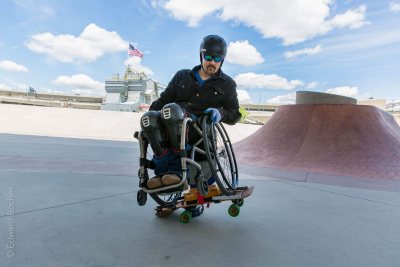
At the Lynch Family Skatepark in Boston, Erik Kondo ’87 rides an electric skateboard he designed. (Edward Boches)
Baumann used a quote from Kondo that urges designers to prioritize users’ agency as they create products for people with disabilities:
“We are the pilots, not the passengers.”
“Equal access is a human rights issue,” Baumann said. “Diversity is humanity’s greatest asset. But inclusion is our greatest challenge.”
- Watch Baumann’s talk: “Designing for Everyone,” weforum.org, Jan. 22, 2019
Alexandra Baldwin ’93
Alexandra Baldwin named Web.com Tour president — The Florida Times-Union
The Florida Times-Union reported that Alexandra Baldwin ’93 is the first woman to head a PGA Tour global circuit.
She was appointed president of the Web.com Tour, a circuit of 27 tournaments that is the “primary path to PGA Tour membership,” wrote reporter Garry Smits. Baldwin was previously vice president of marketing partnerships at PGA Tour and has been a sports management executive for many years.
Baldwin told Smits she is excited to help up-and-coming golfers qualify for PGA Tour membership.
“I have an appreciation and understanding of the tremendous challenges they face on that journey,” she said. “I love working with people and developing relationships, and I think it’s important to listen to them about their goals and aspirations. There are some great success stories out there and we want to see more.”
- Read the story: “Alexandra Baldwin named Web.com Tour president,” The Florida Times-Union, Jan. 30, 2019
Denali Nalamalapu ’17
What we take for granted — Maine Sunday Telegram
For “Meetinghouse,” the Maine Sunday Telegram’s monthly storytelling project, Denali Nalamalapu ’17 wrote about how living in Miri, Malaysia, on a Fulbright award changed her relationship with water.
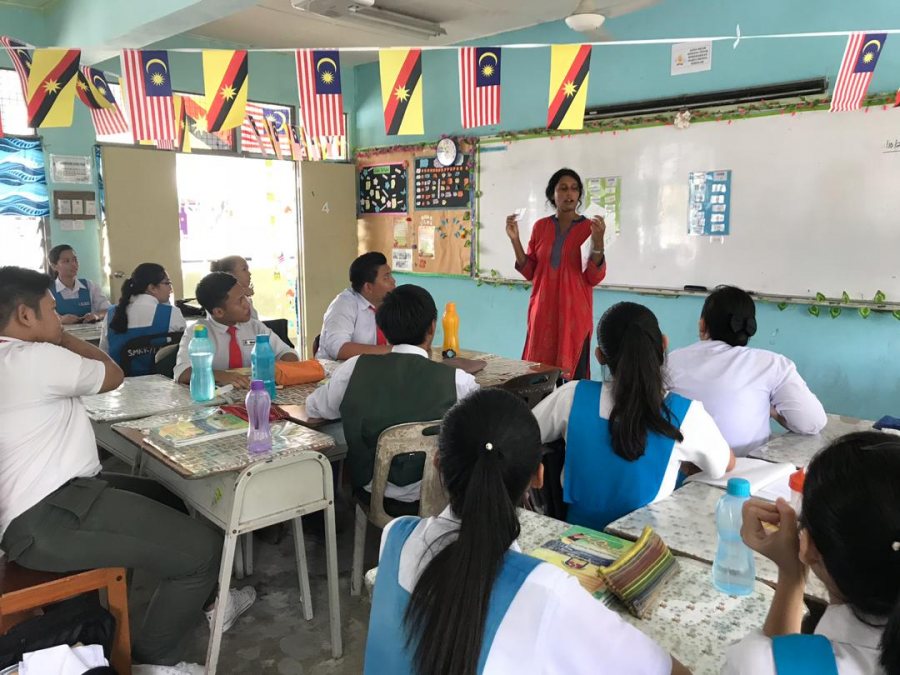
Denali Nalamalapu ’17 teaches in Miri, Malaysia, as a Fulbright English Teaching Assistant. (Courtesy of Denali Nalamalapu)
A native of Falmouth, Maine, Nalamalapu grew up drinking water that “runs clear, cool and sweet from our well,” she wrote. In Miri, where the water is unsafe to drink, she first boiled tap water and then stocked up on filtered water in the city center; she never wasted a single glass.
“So often we take for granted that which is seemingly effortlessly present in our lives,” she wrote. “We forget to acknowledge the labor involved in maintaining that illusion.”
- Read the story: “Denali Nalamalapu, Falmouth: What we take for granted,” Maine Sunday Telegram, Feb. 7, 2019
Leigh Campbell ’64
Campbell elected to the Maine Basketball Hall of Fame — Maine media
The Maine media reported on the induction of Leigh Campbell ’64 into the Maine Basketball Hall of Fame coming up in August.
Entering the hall as one of this year’s seven “Legends of the Game,” Campbell was the official Bates basketball scorer for nearly 50 years and was also the official scorer for the annual Maine high school basketball tournament for decades.
“Leigh Campbell represents the hundreds of unsung heroes that make basketball special in Maine,” the citation reads.
Revered at Bates for supporting generations of students on financial aid, Campbell retired as director of financial aid at Bates in 2007. He received the Helen A. Papaioanou ’49 Distinguished Alumni Service Award at Reunion in 2016.
- Read the story: “Matt Gaudet, Doug Lisherness among 2019 Maine Basketball Hall of Fame inductees,” Sun Journal, Feb. 6, 2019
Ron Ward ’71
Ron Ward, Falmouth: Make a new plan, Stan — Maine Sunday Telegram
Ron Ward ’71 also contributed a personal essay to Meetinghouse, about how, when he was a Bates sophomore, his father left the family, forcing Ward, his mother, and his three siblings to fend for themselves.
Ward wrote that family friends immediately stepped up, helping his 8-year-old sister and infant brother feel a sense of stability during a time of great and unexpected change.
“The enormous help and generosity from our friends, our town, my mother’s employer, my college, much of it spontaneous, were our keys,” Ward wrote.
“Mainers with no direct stake in this outcome allowed this result.”
- Read the story: “Ron Ward, Falmouth: Make a new plan, Stan,” Maine Sunday Telegram, Jan. 17, 2019
Don Dearborn
This bird attracts his Valentine with his heart-shaped red throat sac — Geek.com
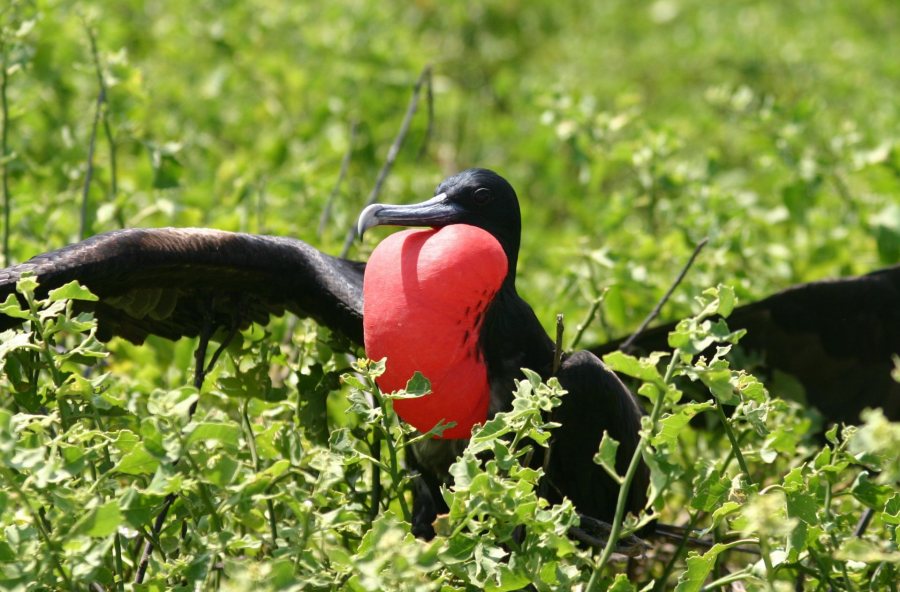
It takes the great frigatebird about 15 to 30 minutes to inflate its throat sac. (Charles J. Sharp, Wikimedia Commons)
Geek.com writer Simone Scully turned to Professor of Biology Don Dearborn to explain how the great frigatebird uses a giant inflatable red throat sac to attract a mate.
“Lots of birds have colorful ornaments, which can be colored feathers or unfeathered, exposed patches of colored skin, but the inflatable aspect of the frigate throat is unusual,” Dearborn told Scully.
When the breeding season rolls around, the frigatebird “inflates this red throat pouch, often in groups with other males, while also quivering his wings, tilting his head back, and clattering his bill as he calls out to the females that circle above him,” Scully wrote.
- Read the story: “This bird attracts his Valentine with his heart-shaped red throat sac,” Geek.com, Feb. 13, 2019
Joshua Macht ’91
How the podcast juggernaut took off — The Boston Globe
For readers of The Boston Globe, Joshua Macht ’91 laid out the current landscape of podcasts, a storytelling medium that has seen explosive growth in the past five years.
“So often, technology and capitalism push us toward ever fancier stuff,” Macht wrote.
“Yet as we ponder how technology changes society, it’s easy to overlook how human beings affect technology. A new entertainment format takes off only when it fits easily into our lives.
“For the moment, audio — with its modest production values and small files that transfer efficiently even over 2013-era phone networks — is doing just that.”
- Read the story: ”How the podcast juggernaut took off,” The Boston Globe, Jan. 16, 2019

